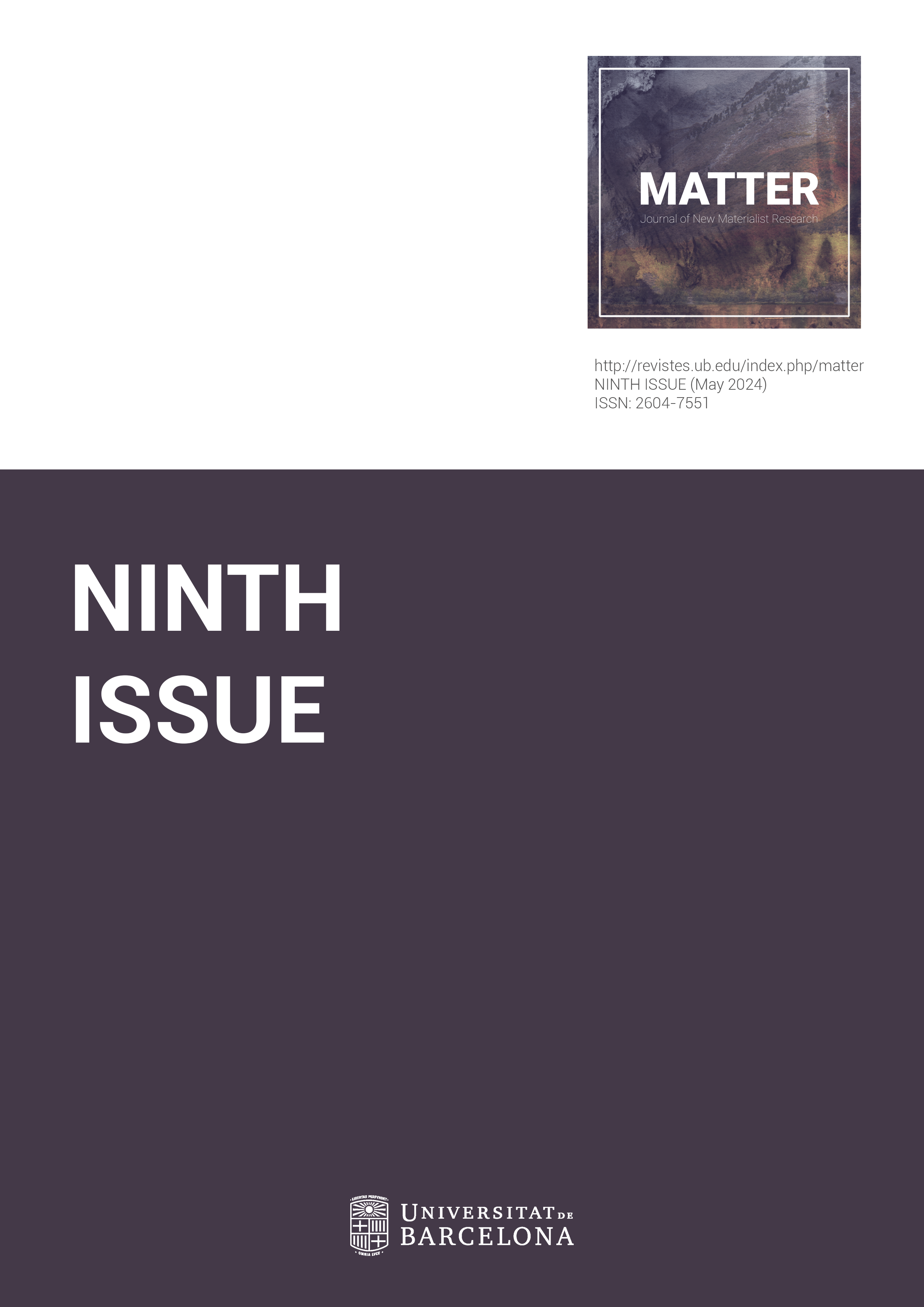The Archive as a World-Making Apparatus in the Anthropocene
DOI:
https://doi.org/10.1344/jnmr.v9.46480Keywords:
archive-de-extinction, Anthropocene, precartity, counterapocalypse.Abstract
This text aims to explore the archive as a powerful force that shapes life. Consequently, it seeks to develop an ethical framework for the archive from a feminist perspective. De-extinction can be linked to the archive as a stabilizing apparatus and a scene of responsibility (Wolfe 2018) that entails our ethical commitment to acknowledge the radical passivity of those who no longer exist in this world, both as individuals and species. This scene of responsibility is intertwined with the agency of the archive. In other words, the archive acts as a life-creating apparatus by shaping the conditions for reading, the future, and, to some extent, reality itself. By establishing the foundations for an ethics of the archive as a practice that creates life, this text aims to reframe the discourse surrounding extinction and de-extinction.
Downloads
References
Braidotti, Rosi, & Hlavajova, Maria (2018). Posthuman glossary. Bloomsbury Academic.
Dawson, Ashley (2018). Bio-capitalism and de-extinction. In Richard Grusin (Ed.), After extinction (pp. 173–200), University of Minnesota Press.
Derrida, Jacques (1967). L’Écriture et la diffèrance. Seuil.
Derrida, Jacques (1995). Archive fever: A Freudian impression. Trans. Eric Prenowitz, Chicago University Press.
Derrida, Jacques (2003). Autoinmunity: Real and symbolic suicides. A dialogue with Jacques Derrida. In Borradori, Giovanna, Habermas, Jürgen, & Derrida, Jacques, Philosophy in a time of terror, University of Chicago Press.
Derrida, Jacques (2006). L’animal que donc je suis. Galilée.
Derrida, Jacques (2009; 2011). The Beast and the Sovereign. Trans. Geoffrey Bennington, University of Chicago Press.
Freud, Sigmund (1950 [1925]). A note upon the ‘Mystic Writing Pad’. In The Standard Edition of the Complete Psychological Works of Sigmund Freud, trans. James Strachey & Anna Freud (pp. 227–232). Hogarth.
Freud, Sigmund (1961 [1929]). Civilization and its discontents. Trans. James Strachey, W.W. Norton & Company Inc.
Glazryna, Yulia (2020). Welcome to the Anthropocene! In Axel Straschnoy, The Permian Collection (pp. 4–9). Bombus.
Haraway, Donna (1988). Situated knowledges: The science question in feminism and the privilege of partial perspective. In Feminist Studies, Vol. 14, No. 3 (Autumn), 575–599.
Hayles, N. Katherine (1999). How we became posthuman: Virtual bodies in cybernetics, literature, and informatics. The Chicago University Press.
Heise, Ursula K. (2003). From extinction to electronics: Dead frogs, live dinosaurs, and electric sheep. In Wolfe, C. (Ed.), Zoontologies. The question of the animal (pp. 59–82), University of Minnesota Press.
Labarre, Suzanne (2019, August 1). MoMA curator: “[Humanity] will become extinct. We need to design an elegant ending”. Fast Company. https://www.fastcompany.com/90280777/moma-curator-we-will-become-extinct-we-need-to-design-an-elegant-ending
Lowenhaupt Tsing, Anna (2015). The mushroom at the end of the world: On the possibility of life in capitalist ruins. Princeton University Press.
Mancuso, Stefano (2019). La nazione delle piante. Laterza.
Parikka, Jussi (2015). A geology of media. University of Minnesota Press.
Pownall, Augusta (2019, February 22). "We don’t have the power to stop our extinction” says Paola Antonelli. dezzeen. https://www.dezeen.com/2019/02/22/paola-antonelli-extinction-milan-triennale-broken-nature-exhibition/
Serres, Michel (1997). Le parasite. Hachette.
Snæbjörnsdóttir, Bryndís, Wilson, Mark (n.d.). Trout fishing in America and other stories. https://snaebjornsdottirwilson.com/projects/trout-fishing-in-america/trout-fishing-in-america-and-other-stories/
Why humanity should embrace its ‘inevitable’ extinction, (2020, January 20). BBC. https://www.bbc.com/reel/video/p080w0dg/why-humanity-should-embrace-its-inevitable-extinction
Wolfe, Cary (Ed.). (2003). Zoontologies. The question of the animal. University of Minnesota Press.
Wolfe, Cary (2010). What is posthumanism?. University of Minnesota Press.
Wolfe, Cary (2018). Condors at the end of the world. In R. Grusin (Ed.), After extinction, University of Minnesota Press.
Zylinska, Joanna (2017). Nonhuman photography. The MIT Press.
Zylinska, Joanna (2018). The end of men. A feminist counterapocalypse. University of Minnesota Press.
Downloads
Published
Issue
Section
License

This work is licensed under a Creative Commons Attribution 4.0 International License.
The authors who publish in this journal agree to the following terms:- Authors retain copyright and grant the journal the right of first publication.
- Texts will be published under a Creative Commons Attribution License that allows others to share the work, provided they include an acknowledgement of the work’s authorship, its initial publication in this journal and the terms of the license.






